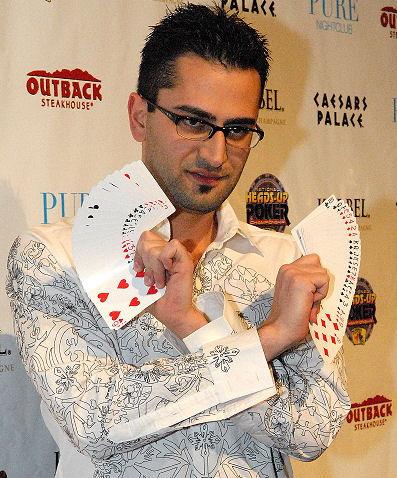Esfandiari’s Triumphant Return Could Spark Another Middle Eastern Poker Boom
Antonio Esfandiari recently reminded everyone why he is affectionately referred to as ‘The Magician’ on the professional poker circuit.
Esfandiari’s cunning and strategy earned him legendary status in poker and those traits were on display when he recently returned to tournament action.
Holding a suited connector, Esfandiari turned a full house on a two-pair board. When Brandon Steven bet $4,000 with J♠4♠ for a flush draw, Esfandiari unleashed a perfectly timed check-raise to $13,000.
An intense table battle followed, but not many players can hold their nerve at a table full of tension like Esfandiari. Steven ultimately folded, handing ‘The Magician’ a pot worth $193,300.
How Esfandiari Helped Poker Go Mainstream
Esfandiari was born in Tehran, Iran. His family fled to the United States during the Iran-Iraq War, seeking a better life. He grew up in California but had issues adjusting to the new environment.
He initially worked as a professional magician – a career that gave him not only his iconic nickname but also the confidence and showmanship that would later define his poker persona.
Esfandiari dabbled No-Limit Texas Hold’em poker at local casinos, aged 19. Many states require players to be over the age of 21, so rumour has it he used fake ID and learned the ropes using a strategy book.
His sharp instincts and natural charisma quickly set him apart, and it did not take long before he started making more money from poker than from his side job as a magician.
Opinions about the game were often negative, and players were treated with suspicion, but the poker boom of the early 2000s changed everything.
The World Poker Tour (WPT) made its debut in 2002, and it was a major game changer for the perception of poker in the United States and around the world.
Movies such as Rounders (1998), starring Edward Norton and Matt Damon, brought the game to a wider audience. The internet also accelerated things, making poker more accessible worldwide than it had ever been before.
Chris Moneymaker’s victory in the 2003 World Series of Poker (WSOP) main event, pocketing a whopping $2.5 million after qualifying online, took things to another level.
His success inspired amateur players across the planet. In 2003, 839 players entered the tournament. Merely three years later, that figure skyrocketed to 8,773 – a record that still stands.
Esfandiari played in the WPT debut season, but it wasn’t until the following edition that he made his mark and announced himself on the global stage.
He claimed his first major victory in February 2004, outwitting 381 other players to pocket $1.4m in prize money. The Iranian-born star’s success drove an upsurge of interest in poker in the Middle East.
Many of the online platforms featured on comparison website Casino YYY subsequently added a plethora of Arab players to their customer databases.
Esfandiari’s success story, going from a young immigrant learning the ropes to a world champion, sparked interest among countless Middle Eastern citizens who now aspire to follow in his footsteps.
Esfandiari’s Legacy Beyond the Game
Esfandiari’s debut marked the start of greatness. Nine years down the line, he achieved what remains one of poker’s most iconic milestones.
The Iranian-American competed in the WSOP inaugural event called Big One for One Drop. The buy-in was pegged at $1m and helped raise a reported $5m for a water charity.
Esfandiari outlasted 48 of the best players in the world to win a mouth-watering $18.4m. It remained a record until US poker star Bryn Kenney won $20.5m at the Triton Million of 2019.
He described the victory as ‘the ultimate, most euphoric out-of-body experience’ of his life.
“Because it wasn’t just me,” he said. “My entire family, my friends, my whole world and everybody in it was up. Financially, socially, everything.
“The whole world was watching. Newspapers in France, Israel, Germany and all over the place were writing that somebody had won $18m playing poker.
“With all the experiences I’ve had in my life, none of them compare to that first minute after realising I had won that tournament.”
The victory cemented Esfandiari’s place among poker’s all-time greats. With over $27m in career earnings, three WSOP bracelets and two WPT titles, his CV speaks for itself.
The 46-year-old has embraced his life as a family man but admitted that the game has changed dramatically since the glory days of the early 2000s.
Since Game Theory Optimal (GTO) strategies emerged, poker has become more analytical than ever. But like everything else, it has its pros and cons.
GTO strategies have undeniably raised the bar in terms of the skill level required to thrive in modern-day poker, but some would argue it has drained the game of its charm and spontaneity.
It is this writer’s opinion that GTO has also given rise to a new generation of players who lack charisma and innovation – two of the key elements that helped grow poker’s popularity on television.
Regardless of how he feels about modern poker, Esfandiari will be proud of his contribution to the game over the years.
For many people, he is a reminder of why they fell in love with the game in the first place.





